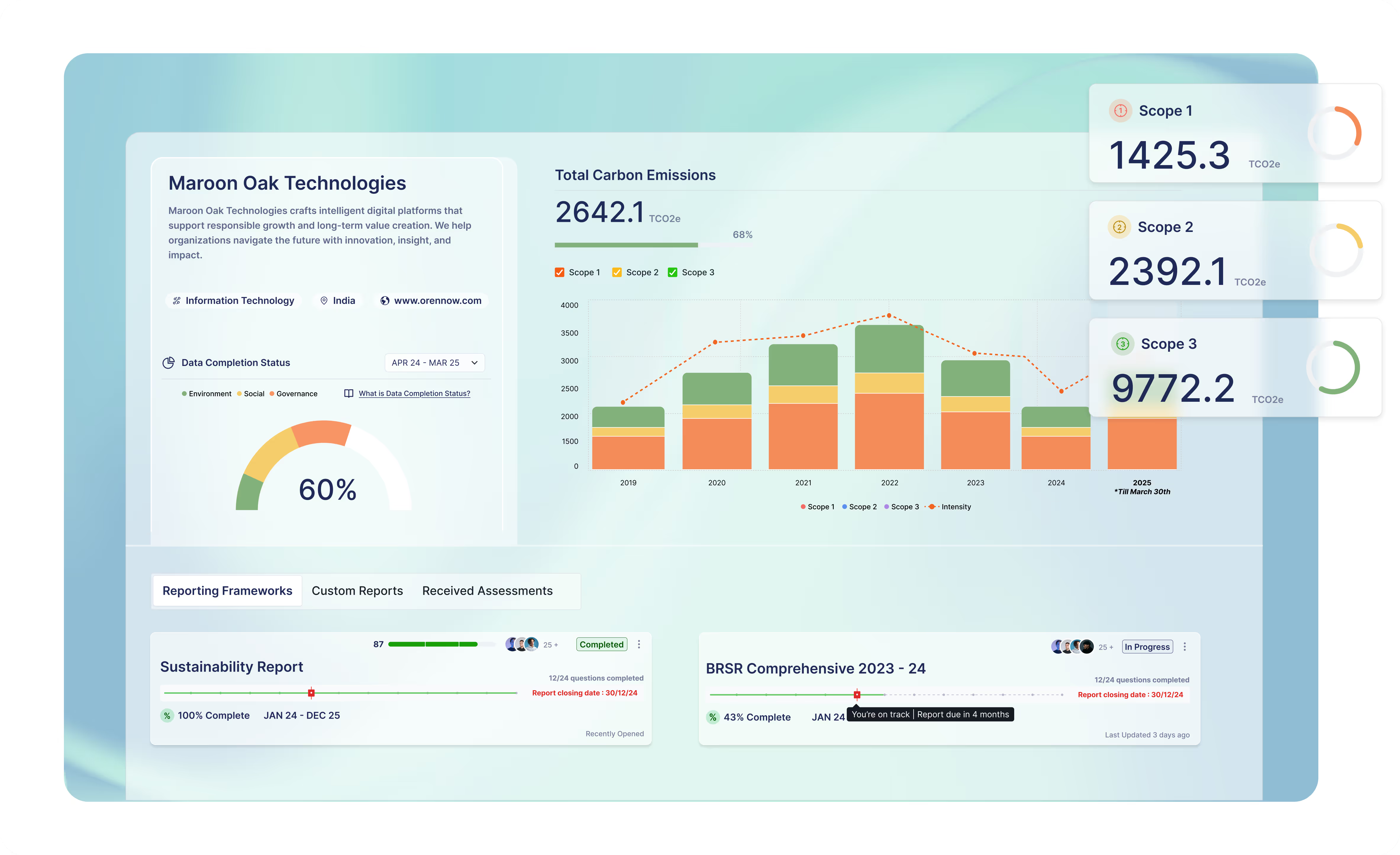Mastering EcoVadis – Environment Theme: Strategies to Improve Your Score

ESG and sustainability - once viewed primarily as a corporate-level reporting activity, is now being integrated as a core component of overall business strategy. In our deeply interconnected global economy, businesses don't operate in isolation; they rely heavily on extensive supply chains. Consequently, as companies elevate their own ESG ambitions, they increasingly recognise the critical need to ensure their suppliers are also advancing on the path to sustainability.
This presents a significant challenge: how can companies effectively and consistently assess the ESG performance of potentially hundreds or thousands of suppliers, often spread across diverse countries and operational contexts?
Enter EcoVadis, the globally recognised gold standard for assessing corporate sustainability performance. With over 150,000 companies evaluated, EcoVadis provides a trusted, standardized methodology that addresses this very need.
Reflecting this shift towards supply chain accountability, many organisations now actively request EcoVadis scorecards from their suppliers. Some are even incorporating minimum EcoVadis score requirements into contracts and tender processes, making a strong score essential for securing and retaining business.
Why Your EcoVadis Environment Score is Business-Critical
The EcoVadis framework evaluates companies across four pillars: Environment, Labour & Human Rights, Ethics, and Sustainable Procurement. The Environment theme scrutinises how your company manages its operational and product-related impacts, from energy consumption and greenhouse gas (GHG) emissions to water usage, waste generation, and biodiversity protection.
Why the intense focus?
- Stakeholder Expectations: Mounting global concerns about climate change, pollution, and resource scarcity mean stakeholders expect proactive environmental management.
- Supply Chain Requirements: EcoVadis is widely used by large corporations to assess their suppliers' sustainability. A low Environment score can be a barrier to entry or retention in key supply chains.
- Competitive Advantage: A high score enhances your brand reputation, attracts environmentally conscious customers and talent, and can appeal to ESG-focused investors.
- Risk Mitigation: Strong environmental practices help mitigate operational risks, ensure regulatory compliance, and build long-term resilience.
Decoding the EcoVadis Environment Criteria: What's Assessed?
EcoVadis assesses performance across 7 Management Indicators, covering Policies, Actions, and Results Reporting (KPIs). The specific environmental topics evaluated (activated criteria) depend on your company's size, industry, and location. Common areas include:
#1 Operations
- Energy Consumption & Greenhouse Gas (GHG) Emissions: Your strategy for managing energy use and reducing your carbon footprint (Scope 1 & 2 emissions are fundamental; Scope 3 is increasingly important).
- Water: Your approach to water conservation, consumption monitoring, efficiency improvements, and wastewater management.
- Biodiversity: Efforts to minimise impacts on natural habitats, ecosystems, and local species.
- Local & Accidental Pollution: Measures to prevent and control air, water, and soil pollution from routine operations and potential accidents.
- Materials, Chemicals & Waste: Management of raw materials, hazardous substances, and waste streams, emphasising reduction, reuse, recycling, and responsible disposal.
#2 Products
- Product Use: Evaluating and mitigating the environmental impact during the customer's use of your product (e.g., energy efficiency).
- Product End-of-Life: Addressing the environmental impacts related to product disposal, reuse, or recycling (e.g., designing for disassembly, take-back programs).
- Customer Health & Safety: Environmental aspects of your products potentially affecting user health (e.g., hazardous materials).
- Environmental Services & Advocacy: Offering products/services with clear environmental benefits or engaging in pro-environmental advocacy.
#3 Sustainable Procurement
- While a separate theme, your efforts to embed environmental criteria into purchasing decisions and manage supplier environmental performance also influence overall perceptions and can indirectly relate.
6 Actionable Steps to Boost Your EcoVadis Environment Score
Improving your score requires a structured, evidence-based approach. Here’s how to tackle it:
#1 Build a Strong Foundation: Environmental Policy & Governance
- Develop a Comprehensive Policy: Document your company's formal commitment to environmental protection. This policy should address the key environmental impacts relevant to your business (based on activated criteria).
- Define Scope & Objectives: Clearly state which sites, activities, and business units the policy covers. Include both qualitative commitments (e.g., "minimise waste") and SMART quantitative targets (e.g., "reduce Scope 1 & 2 GHG emissions by 30% by 2030 from a 2022 baseline").
- Establish Governance: Outline roles, responsibilities, and oversight mechanisms for implementing the policy and achieving objectives.
- Regular Review: Ensure the policy is reviewed and updated periodically (at least every 3 years is good practice) to remain relevant.
#2 Implement a Robust Environmental Management System (EMS)
- Systematic Approach: An EMS provides the framework to manage environmental aspects systematically. ISO 14001 certification is highly valued by EcoVadis (earning points under 'Certifications') but implementing the principles of an EMS is key even without certification.
- Identify Aspects & Impacts: Formally identify how your operations interact with the environment and the resulting impacts.
- Set Goals & Track KPIs: Establish measurable Key Performance Indicators (KPIs) for significant environmental aspects (energy, water, waste, emissions). Monitor progress regularly.
- Document Procedures: Create clear operational procedures for managing key environmental tasks (e.g., waste segregation, spill response).
#3 Tackle Energy Consumption & GHG Emissions Strategically
- Measure & Monitor: Implement systems to accurately track energy consumption (electricity, gas, fuel) and calculate Scope 1 (direct) and Scope 2 (indirect - purchased energy) GHG emissions. Familiarise yourself with the GHG Protocol.
- Reduce & Optimise: Implement energy efficiency measures (e.g., LED lighting, equipment upgrades, process optimisation). Explore renewable energy options (on-site generation or purchasing). An ISO 50001 energy management system can drive significant improvements and gain EcoVadis points.
- Scope 3 Awareness: Begin understanding and measuring key Scope 3 (value chain) emissions, especially if required by customers or regulations.
- Set Targets: Consider setting ambitious reduction targets, potentially aligned with the Science Based Targets initiative (SBTi), which is well-regarded by EcoVadis. Document energy audits and resulting actions.
#4 Master Water & Waste Management
- Water Stewardship: Track water consumption, identify high-usage areas, and implement water-saving technologies or process changes. Ensure proper wastewater treatment and compliance with discharge permits. Document water usage KPIs.
- Waste Hierarchy: Focus on the waste hierarchy: Prevent > Reduce > Reuse > Recycle > Recover > Dispose. Implement source reduction initiatives.
- Improve Waste Handling: Establish clear procedures for waste segregation, collection, and storage. Partner with certified waste management providers for recycling and disposal. Track waste generation KPIs (total waste, recycled vs. landfilled amounts).
#4 Drive Environmental Performance Across Products & Services
- Life Cycle Thinking: Assess the environmental impact of your products throughout their lifecycle, from raw material extraction to end-of-life.
- Eco-Design: Integrate environmental considerations into product design (e.g., using recycled materials, designing for durability/repairability/recyclability, reducing hazardous substances).
- Transparency: Provide customers with information on the environmental aspects of your products and their proper use/disposal.
#5 Engage Your Value Chain (Stakeholders & Suppliers)
- Employee Awareness & Training: Educate employees about your environmental policy, objectives, and their specific roles in achieving them. Conduct regular training on environmental procedures.
- Supplier Engagement: Communicate your environmental expectations to suppliers, potentially through a Supplier Code of Conduct. Assess the environmental performance of key suppliers (using questionnaires, audits, or requiring certifications like ISO 14001).
- Collaboration & Communication: Collaborate with industry peers on environmental initiatives. Communicate your environmental performance and progress transparently through sustainability reports or dedicated web pages.
The Critical Role of Documentation: Proving Your Performance
EcoVadis is fundamentally evidence-based. You must substantiate your claims with documentation. With a strict limit on document uploads (currently 55), effective evidence management is key. Ensure your documents are:
- Relevant: Directly address the EcoVadis criteria and pertain to the assessed entity.
- Up-to-Date: Policies/Actions generally within 8 years, KPIs/Reporting within 2 years. Avoid documents created just for the assessment (less than ~2 months old might be flagged).
- Credible: Pre-existing, integrated into operations, clearly showing company name/logo and dates. Third-party certifications (like ISO) are highly credible.
- Comprehensive: Cover the scope of your activities. Consolidated reports (like annual Sustainability/ESG Reports) are efficient for showcasing multiple KPIs and initiatives.
Pro Tip: Create a centralised repository for all sustainability-related documentation. Clearly label files and highlight relevant sections or data points within documents before uploading to make the evaluator's job easier.
Leveraging Your EcoVadis Scorecard for Continuous Improvement
Your EcoVadis scorecard is more than just a grade; it's a roadmap.
- Analyse Strengths & Weaknesses: Understand where you excel and where gaps exist.
- Prioritise Corrective Actions: The scorecard explicitly lists areas for improvement, often ranked by potential impact. Focus your efforts here.
- Conduct Gap Analysis: Compare your current practices against EcoVadis expectations for higher scoring brackets.
- Develop an Action Plan: Create a time-bound plan with clear responsibilities to address identified weaknesses.
- Monitor & Iterate: Track progress against your action plan and use insights for the next assessment cycle. Sustainability is a journey of continuous improvement.
Bonus Tips for Overall EcoVadis Success
- Start Early: The process takes time, especially gathering documentation. Don't wait until the last minute.
- Build a Cross-Functional Team: Involve representatives from Environment, Operations, HR, Procurement, Legal, and Communications. Assign clear roles.
- Understand the Methodology: Read the EcoVadis guidance documents carefully to grasp how Policies, Actions, and Results Reporting are weighted.
- Stay Informed: EcoVadis methodology evolves. Keep track of updates and broader ESG trends.
- Seek External Expertise: Consider engaging external subject matter experts, such as Oren's ESG Experts, to guide you through the EcoVadis journey. They can provide valuable support, from initial gap analysis and policy assessment to creating robust sustainability reports and managing the final submission process.
Conclusion: Turning Environmental Commitment into Competitive Advantage
Improving your EcoVadis Environment score is a strategic imperative that reflects a genuine commitment to sustainability. By developing robust policies, implementing effective ESG data management systems, meticulously tracking and reporting on energy, water, waste, and emissions, engaging your value chain, and providing solid documentation, you can significantly elevate your performance.
Remember, the goal extends beyond achieving an EcoVadis medal. It's about building a more resilient, responsible, and reputable business that actively contributes to a healthier planet while unlocking new opportunities in an increasingly sustainability-focused global marketplace.


-p-1080.avif)


